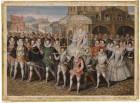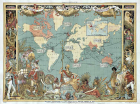Britain & Ireland
The Tudors continue to fascinate and some of their story is told here along with the other dynasty of the period the Stuarts. Alongside those resources are the podcasts on the ideas that transformed British society during that period and created a United Kingdom for the first time. The industrial revolution is explored through poetry as well as technology. Religious collapse, change and diversity are all themes explored in this section. Read more
Sort by:
Date (Newest first) | Title A-Z
Show:
All |
Articles |
Podcasts |
Multipage Articles
-

Virtual Branch Recording: The Fall of the English Republic
ArticleClick to view -

Virtual Branch Recording: The cultural world of Elizabethan England
ArticleClick to view -

Joan Vaux: a remarkable Tudor lady
ArticleClick to view -

Tudor queens: power, identity and gender
ArticleClick to view -

Elizabeth I: ‘less than a woman’?
ArticleClick to view -

Film: The ladies-in-waiting who served the six wives of Henry VIII
ArticleClick to view -

After the revolution: did Cromwell, Washington and Bonaparte betray revolutionary principles?
ArticleClick to view -

A woman of masculine bravery: the life of Brilliana, Lady Harley
ArticleClick to view -

‘Zulu’ and the end of Empire
ArticleClick to view -

The British Empire on trial
ArticleClick to view -

What Have Historians Been Arguing About... the impact of the British Empire on Britain?
ArticleClick to view -

History Abridged: The census
ArticleClick to view -

Eyam: the plague village 1665-66
ArticleClick to view -

Film: Attic Inscriptions
ArticleClick to view -

The Origins of Mass Society: Speech, Sex and Drink in Urbanising Britain, 1780-1870
ArticleClick to view -

The 1620 Mayflower voyage and the English settlement of North America
ArticleClick to view -

The changing convict experience: forced migration to Australia
ArticleClick to view -

Immigration and the making of British food
ArticleClick to view -

What Have Historians Been Arguing About... migration and empire
ArticleClick to view -

What have historians been arguing about... decolonisation and the British Empire?
ArticleClick to view


